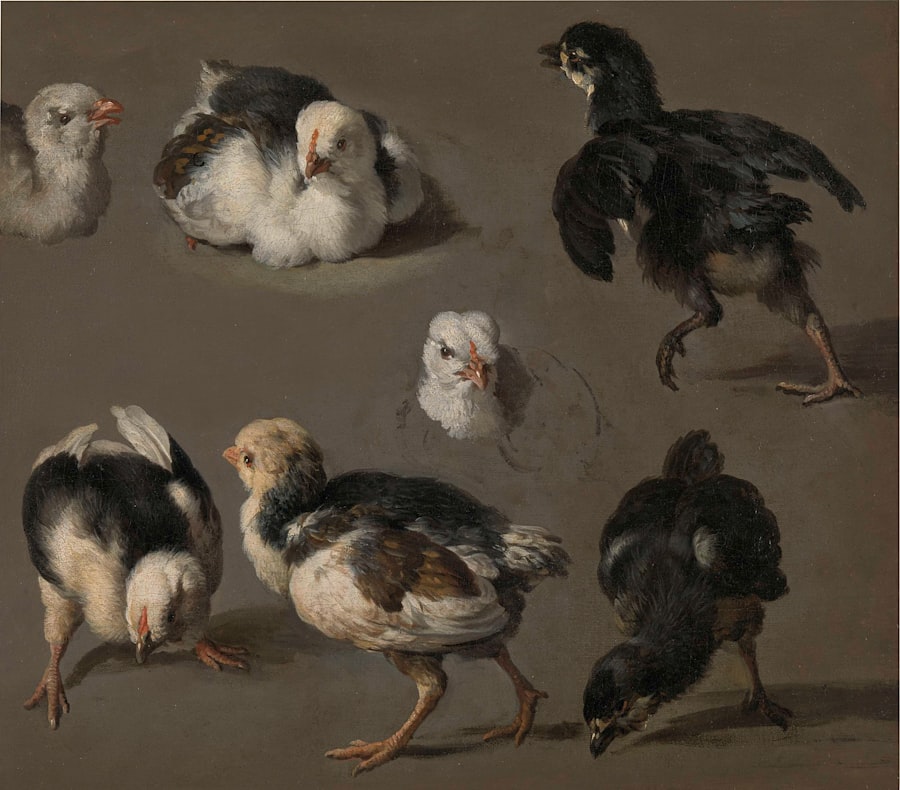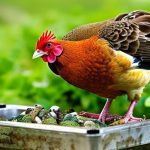Raccoons are a common predator of backyard chickens and can cause significant damage to your flock and coop. These clever and resourceful creatures are known for their ability to break into coops and harm or kill chickens. It’s important to take steps to protect your chickens from raccoons to ensure their safety and well-being.
Key Takeaways
- Raccoons pose a serious threat to chickens and their coops, and it’s important to take steps to protect your flock.
- Signs of raccoon activity in your chicken coop include missing eggs, scattered feed, and damage to the coop or fencing.
- Fortifying your chicken coop with secure locks, sturdy materials, and predator-proof fencing can help keep raccoons out.
- Choosing a well-lit and visible location for your chicken coop can deter raccoons from approaching.
- Using lighting and sound strategies, such as motion-activated lights and radios, can help keep raccoons away from your chickens at night.
Identifying Signs of Raccoon Activity in Your Chicken Coop
One of the first steps in protecting your chickens from raccoons is to identify signs of their activity in your coop. Look for signs of damage, such as broken windows or doors, torn wire mesh, or holes in the walls or roof. Raccoons are known for their dexterity and can easily manipulate weak or flimsy materials.
Another sign of raccoon activity is footprints or droppings. Raccoon footprints are distinctive and can be easily identified by their five-toed shape with long fingers. Raccoon droppings are similar in appearance to dog feces but are smaller and often contain undigested food particles.
Lastly, listen for noises at night. Raccoons are primarily nocturnal animals and are most active during the night. If you hear scratching, thumping, or other unusual sounds coming from your coop, it could be a sign that raccoons are trying to gain access.
Securing Your Chicken Coop: Tips for Fortifying Your Flock’s Home
To protect your chickens from raccoons, it’s important to fortify your coop with sturdy materials. Use solid wood or metal for the walls, roof, and floor of your coop. Avoid using materials like plastic or chicken wire, as raccoons can easily chew through them.
Cover windows and vents with hardware cloth, which is a strong wire mesh that raccoons cannot easily penetrate. Make sure to secure the hardware cloth tightly to prevent any gaps or openings.
Install locks on doors and windows to ensure that raccoons cannot open them. Use heavy-duty locks that are difficult for raccoons to manipulate. Consider using padlocks or barrel bolts for added security.
Choosing the Right Chicken Coop Location to Deter Raccoons
| Location | Raccoon Activity | Chicken Safety |
|---|---|---|
| Wooded Area | High | Low |
| Open Field | Low | High |
| Near Water Source | High | Low |
| Close to Human Activity | Low | High |
The location of your chicken coop can play a significant role in deterring raccoons. Avoid placing your coop near wooded areas, as raccoons are more likely to be found in these areas. Instead, choose a location with good visibility, preferably near your house or a well-lit area.
Consider using motion-activated lights or alarms around your coop. Raccoons are nocturnal animals and are often deterred by bright lights or loud noises. These deterrents can help scare away raccoons and prevent them from approaching your coop.
Keeping Your Chickens Safe at Night: Lighting and Sound Strategies
Raccoons are most active at night, so it’s important to take extra precautions to keep your chickens safe during this time. Use a timer to turn on lights in and around your coop. This will create a well-lit environment that raccoons are less likely to approach.
Play music or use a radio to create noise in and around your coop. Raccoons are wary of unfamiliar sounds and may be deterred by the presence of human activity. Choose music or radio stations with loud and continuous noise to create a deterrent effect.
Consider using a predator deterrent device, such as a motion-activated light or sound device. These devices emit bright lights or loud noises when triggered by motion, scaring away raccoons and other predators.
Feeding Your Chickens Safely: How to Minimize the Risk of Raccoon Intrusion

Feeding your chickens safely is another important aspect of protecting them from raccoons. Don’t leave food out overnight, as this can attract raccoons and other predators. Instead, feed your chickens during the day and remove any uneaten food before nightfall.
Use a secure feeder that is difficult for raccoons to access. Choose a feeder with a lid or cover that can be securely fastened. This will prevent raccoons from stealing or contaminating your chickens’ food.
Store feed in a secure container that raccoons cannot open. Use metal or plastic bins with tight-fitting lids to keep your chickens’ feed safe from raccoon intrusion.
Raccoon-Proofing Your Chicken Run: Fencing and Netting Options
In addition to securing your coop, it’s important to raccoon-proof your chicken run as well. Use a sturdy fence around your run to prevent raccoons from gaining access. Choose a fence that is at least six feet tall and bury the bottom of the fence at least one foot deep to prevent raccoons from digging underneath.
Consider using electric fencing as an additional deterrent. Electric fencing delivers a mild shock to any animal that comes into contact with it, including raccoons. This can be an effective way to keep raccoons away from your chickens.
Use netting to cover the top of your run to prevent raccoons from climbing over. Raccoons are excellent climbers and can easily scale fences or walls. By covering the top of your run with netting, you can create a barrier that raccoons cannot penetrate.
Natural Deterrents: Using Plants and Scents to Keep Raccoons at Bay
There are also natural deterrents that can help keep raccoons away from your chickens. Plant herbs or flowers that raccoons dislike around your coop and run. Some plants that are known to repel raccoons include marigolds, mint, and garlic. These plants emit strong scents that raccoons find unpleasant.
Use predator urine or other scents to deter raccoons. Predator urine, such as coyote or fox urine, can be purchased at garden centers or online. Spray the urine around your coop and run to create the illusion of a predator presence, which can deter raccoons.
Consider using a motion-activated sprinkler as a natural deterrent. These sprinklers release a burst of water when triggered by motion, scaring away raccoons and other pests. This can be an effective and humane way to keep raccoons at bay.
Trapping and Removal: When to Call in the Professionals
If you have a persistent raccoon problem despite your best efforts, it may be necessary to call a professional for trapping and removal. Raccoons are intelligent and resourceful animals, and attempting to trap or remove them on your own can be dangerous.
Professional trappers have the knowledge and experience to safely and humanely remove raccoons from your property. They can also provide advice on how to prevent future raccoon infestations and protect your chickens.
Maintaining a Safe and Happy Home for Your Chickens
By taking steps to protect your chickens from raccoons, you can ensure they stay safe and healthy. Regularly check your coop and run for signs of damage or intrusion, and make any necessary repairs or improvements. With a little effort, you can create a safe and happy home for your feathered friends.
If you’re looking for ways to protect your chickens from raccoons, you might also be interested in learning about the best chicken coop door size. Having the right size door can help prevent raccoons from gaining access to your coop and harming your chickens. Check out this informative article on poultrywizard.com to find out more about the ideal door size for your chicken coop and keep those pesky raccoons at bay.
FAQs
What are raccoons?
Raccoons are medium-sized mammals native to North America. They are known for their distinctive black mask-like markings around their eyes and their ringed tails.
Why do raccoons attack chickens?
Raccoons are omnivores and will eat almost anything, including chickens. They are attracted to the smell of chickens and their eggs, making them a common predator for backyard chicken owners.
What are some signs that raccoons are attacking my chickens?
Signs of raccoon attacks on chickens include missing birds, feathers scattered around the coop, and damage to the coop or fencing.
How can I keep raccoons away from my chickens?
There are several ways to keep raccoons away from chickens, including securing the coop with sturdy fencing and locks, using motion-activated lights or sprinklers, and removing any potential food sources from the area.
What should I do if I find a raccoon in my chicken coop?
If you find a raccoon in your chicken coop, do not attempt to handle it yourself. Contact a professional wildlife removal service to safely and humanely remove the raccoon from your property.
Meet Walter, the feathered-friend fanatic of Florida! Nestled in the sunshine state, Walter struts through life with his feathered companions, clucking his way to happiness. With a coop that’s fancier than a five-star hotel, he’s the Don Juan of the chicken world. When he’s not teaching his hens to do the cha-cha, you’ll find him in a heated debate with his prized rooster, Sir Clucks-a-Lot. Walter’s poultry passion is no yolk; he’s the sunny-side-up guy you never knew you needed in your flock of friends!







